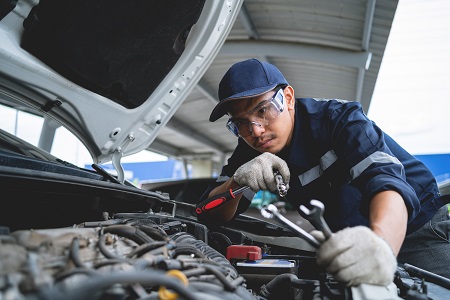You’re at the automotive repair mechanic‘s, and you’re unsure what to ask. Don’t worry! We’ve got you covered. It’s crucial to know the right questions to ensure you’re taking proper care of your car.
This guide will help you understand your car’s diagnosis, inquire about warranties, discuss replacement parts, and plan for future repairs.
Let’s decode the complex jargon and turn you into an informed customer who can confidently navigate any auto repair conversation.
Importance of Asking About the Repair Timeline

You should always ask about the repair timeline to manage your expectations and schedule effectively. It’s not just about getting your car back on the road as quickly as possible but also about coordinating your daily life around the repair process.
Let’s break it down a bit. When your mechanic gives you a timeline, they’re factoring in several elements. The first is diagnostics, determining exactly what’s wrong with your car. Then, there’s ordering parts if they’re not in stock. After that comes the actual repair work. This can vary greatly depending on the complexity of the issue. You’ve got simpler tasks like brake pad changes, which won’t take more than a couple of hours. On the other hand, major engine repairs can stretch over several days.
But remember, your mechanic’s shop isn’t just dealing with your car. They’ve got other vehicles in the queue. So, when you’re given a timeline, it’s a balance of all these factors. Don’t hesitate to ask for updates and make sure they’re sticking to the schedule. After all, it’s your time and money on the line.
Key Questions About Your Car’s Diagnosis
It’s crucial to ask specific questions about your car’s diagnosis and not just accept the initial verdict. You see, the automotive industry can be a maze of technical jargon, so it’s essential to get clear, concise information. Your first question should be, ‘What exactly is the issue?’ Don’t let your mechanic simply hand you a list of parts to be replaced. Press for a straightforward explanation.
Next, ask, ‘What caused this problem?’ This can help you understand if it’s a wear-and-tear issue or something you did that might need to change.
Now, ask, ‘Is it necessary to fix immediately?’ Some issues can wait, others can’t. This is about safety and preventing more costly future repairs.
Then, ‘What will happen if this issue isn’t addressed?’ You’re entitled to know the consequences, which could range from decreased fuel efficiency to a breakdown.
Finally, ‘Are there any alternatives to the suggested repair?’ There might be a cheaper or less invasive option available.
Inquiring About Warranties and Guarantees
Have you asked about the warranty on these parts and services, and if so, what’s the extent of the coverage? Knowing the details can save you from unexpected costs and hassles down the road.
In the auto repair industry, warranties are essentially promises that the parts installed or services performed will function properly for a specified period. If they don’t, the mechanic promises to correct the issue at no additional charge. But warranties can vary greatly, so it’s important to ask:
- What exactly does the warranty cover? Is it only the parts, or does it include labor as well?
- How long does the warranty last? Is it measured in months, miles driven, or both?
- What’s the procedure if a covered part fails or a service doesn’t rectify the issue?
These queries not only help you understand your rights and obligations, but they also reveal the level of confidence the mechanic has in their work. A robust, comprehensive warranty indicates that they stand behind their services, giving you peace of mind.
Knowing the Right Questions About Replacement Parts
Let’s now turn our attention to understanding what questions to ask when it comes to replacement parts for your vehicle.
Are the parts new, rebuilt, or aftermarket? This is crucial as it impacts the quality, performance, and price of the parts. You’ll also want to ask if the parts meet or exceed Original Equipment Manufacturer (OEM) specifications.
Get clarity on warranties as well. What’s covered, and for how long? It’s smart to inquire about the installation process, too. Is it included in the price, or does it cost extra?
Always remember, knowledge is power when it comes to auto repairs.
- Product Specs: New, rebuilt, or aftermarket; meet or exceed OEM specifications
- Pros: Potential for high-quality parts, the possibility of warranty, the potential for included installation
- Cons: Possibly higher cost, potential for aftermarket parts not meeting OEM specs, extra cost for installation.
Asking About Preventive Maintenance and Future Repairs
You should ask your skilled mechanic about preventive maintenance and future repairs. This not only helps in ensuring your vehicle’s longevity but also saves you from unexpected breakdowns and hefty repair bills. It’s about protecting your investment and your peace of mind.
When you get the chance, don’t shy away from these important questions:
- What preventive maintenance does my car need based on its age and mileage?
- Are there any signs of potential future repairs?
- How can I prolong my vehicle’s lifespan and prevent costly repairs?
Understanding the answers to these queries fills you with a sense of control. You’re no longer at the mercy of unknown mechanical failures; you’re now a proactive car owner. It’s empowering, isn’t it?
Moreover, knowing your car’s potential issues allows you to budget for future repairs. There’s no sudden financial strain; you’re prepared. It’s like a weight lifted off your shoulders.
In essence, your auto mechanic isn’t just a repairman; he’s a guide who helps you navigate the complex world of auto maintenance. By asking the right questions, you’re not just taking care of your car; you’re taking care of yourself, too.
Navigating the Conversation About Unforeseen Complications
In the next part of our discussion, we’re tackling five key questions to pose to your mechanic to smoothly navigate the conversation about unforeseen complications.
- ‘What’s wrong with my car?’ It’s important to understand the issue before you can approach solutions. A good mechanic won’t mind explaining in layman’s terms.
- ‘Is this a common problem?’ Knowing if it’s a common issue can give you peace of mind that it’s not something unusual or overly complex.
- ‘What caused this problem?’ This helps you understand if it’s a result of wear and tear, a manufacturing defect, or a maintenance lapse on your part.
- ‘Can you show me the problem?’ Seeing is believing. A reputable mechanic will be happy to show you the issue.
- ‘What are my repair options?’ There may be more than one way to fix the problem. This question helps you weigh the cost and time of different repair options.
Go to Art Morse Auto Repair for an Expert Car Mechanic
Art Morse Auto Repair‘s expert mechanics won’t let you down, and we will ensure your car’s problem is fixed right the first time. With over four decades of experience, we have built a reputation for excellent customer care. You’re not just another repair job; you’re part of the Art Morse family.
We stand by a transparent pricing policy, so you’ll never be blindsided by hidden costs. We are dedicated to keeping you informed every step of the way, explaining the technical jargon in a language you can easily understand.
Here are a few reasons to choose Art Morse Auto Repair for your car needs:
- Our ASE master-certified mechanics offer the highest level of skill and expertise in the field.
- Our auto repair team values long-term customer relationships built on trust and outstanding repair service.
- We have a solid track record of excellence, largely earned by word of mouth.
Contact us for quality car repair work.
Services we provide:
- Maintenance Services
- Check Engine Light
- Brake System Repairs
- Engine Repair
- Exhaust Repair
- And More
Visit our About Us page for more information about our top-quality auto repair shop.

